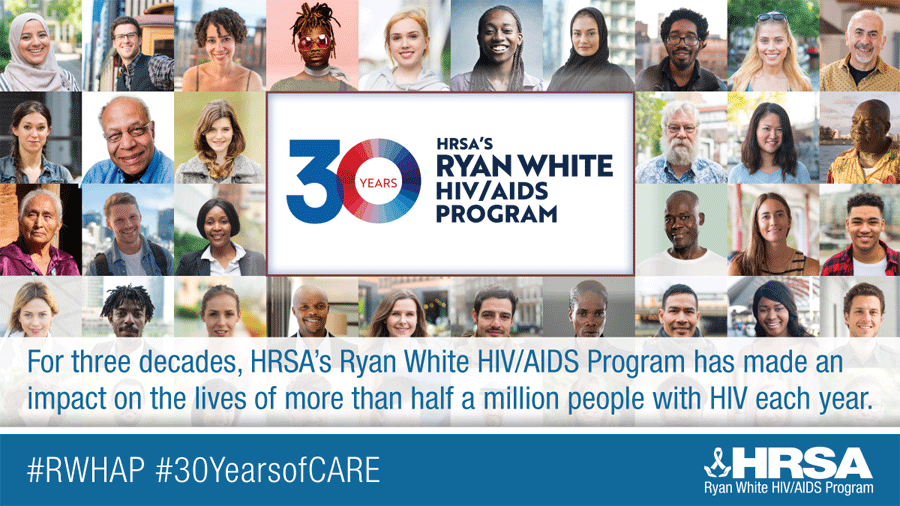HRSA Celebrates 30 Years of the Ryan White CARE Act
Topics

Today the Health Resources and Services Administration (HRSA) celebrates the 30th anniversary of the historic legislation that created the Ryan White HIV/AIDS Program. Signed into law on August 18, 1990, the Ryan White Comprehensive AIDS Resources Emergency (CARE) Act created the largest Federal program focused exclusively on providing care and treatment services to people with HIV, which today provides services to more than half a million people each year.
The Program was named for a courageous young man diagnosed with AIDS in 1984. Ryan White fought AIDS-related discrimination in his Indiana community while fighting for his right to attend school and educated the nation about his disease. Ryan White died only months before Congress passed the legislation in 1990.
The anniversary theme is “30 Years of Innovating Care, Optimizing Public Health, Ending the HIV Epidemic.” I had the privilege to watch this theme come to life last week while joining the more than 5,500 attendees at the virtual 2020 National Ryan White Conference on HIV Care and Treatment.
HRSA’s Ryan White HIV/AIDS Program has been vital to the public health response to HIV in the United States for the last three decades. The Program provides a comprehensive system of HIV primary medical care, medication, and essential support services to approximately 50 percent of people with diagnosed HIV in the United States each year. As a result of these services, 87.1 percent of Ryan White HIV/AIDS Program clients receiving HIV medical care are virally suppressed, which means they are living healthier lives and can go on to have near normal lifespans. It also means they have effectively no risk of spreading HIV to their partners sexually if they continue to take their HIV medication daily as prescribed.
Early in the epidemic, HRSA and the Ryan White HIV/AIDS Program were on the frontlines working to address the critical needs of people with HIV to reduce stigma, provide health care services for patients, and train providers in delivering culturally-appropriate HIV care and treatment. Today during this unprecedented time of the COVID-19 pandemic, Ryan White HIV/AIDS Program recipients and providers continue to demonstrate their dedication to improving the lives of people with HIV by serving on the frontlines, supporting clients and communities who are among the most vulnerable populations. This includes people with HIV from racial/ethnic minority populations, older adults, men who have sex with men, transgender individuals, and women— those who without the Ryan White HIV/AIDS Program would not receive HIV care and life-extending medication.
Thirty years later, the Ryan White HIV/AIDS Program continues its commitment to addressing health disparities in underserved communities and to ensuring access to and retention in high quality, integrated care and treatment services for all people with HIV as we continue to move forward with ending the HIV epidemic. The Program is a key part of the Administration’s Ending the HIV Epidemic: A Plan for America, a 10-year initiative that aims to reduce new HIV infections in the United States by 90 percent by 2030. Thanks in large part to the continuing efforts of the Ryan White HIV/AIDS Program over the last 30 years, we have the tools we need to end the HIV epidemic in the United States.
For more information on HRSA’s Ryan White HIV/AIDS Program, visit www.hab.hrsa.gov. For more information on the Ending the HIV Epidemic initiative, visit https://www.hiv.gov/federal-response/ending-the-hiv-epidemic/overview.